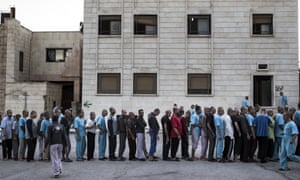
One in five people living in areas beset by conflict have mental health conditions, according to data from the World Health Organization that suggests far more help for survivors is needed.
The figures are substantially higher than previously thought. Data published in 2016 suggested one in 16 people in conflict zones had mental health problems. But the WHO says its figures are more robust because they are based on 129 studies, of which 45 have not been included in estimates before.
The WHO’s paper, published in the Lancet medical journal, says 22% of people living in conflict areas have depression, anxiety, post-traumatic stress disorder, bipolar disorder or schizophrenia. Women are more likely to be affected than men and the burden rises with age. In about 9% of the population, the mental disorder is moderate to severe. In 13%, it is mild.
“Although the clinical significance of mild mental disorders in emergencies can be contested, the clinical needs of people with severe mental disorders are too often neglected,” says the paper, which calls for more resources to be directed into mental healthcare in conflict zones.
“Mental healthcare must be prioritised in countries affected by conflict, not least for the well-established links between mental health, functioning and country development.”
Armed conflicts reached an all-time high in 2016 – 53 in 37 countries, says the paper. About 12% of the world’s population were living in a conflict zone and 69 million people were forcibly displaced by violence – the highest number since the second world war.
There are major humanitarian crises brought about by conflict in Afghanistan, Iraq, Nigeria, Somalia, South Sudan, Syria and Yemen.
Fiona Charlson of the University of Queensland, Australia, and the Institute for Health Metrics and Evaluation in the US, who was the lead author of the study, said: “I am confident that our study provides the most accurate estimates available today of the prevalence of mental health conditions in areas of conflict.
“Estimates from previous studies have been inconsistent, with some finding inconceivably low or high rates.”
There are limitations, the authors acknowledged, because the data is not easy to collect. For instance, there was insufficient evidence on the burden of psychosis, and alcohol disorders were not included.
Dr Mark van Ommeren of the WHO’s department of mental health and substance abuse, who was also one of the authors, said there were opportunities after conflicts to do more for people.
“Despite their tragic consequences, when the political will exists, emergencies can be catalysts for building quality, sustainable mental health services that continue to help people in the long term,” he said.
[“source=theguardian”]



